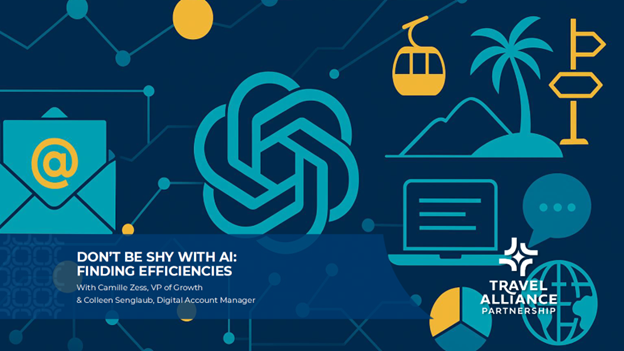AI in Tourism
Artificial intelligence is reshaping how the tourism industry connects with travelers, manages operations, and markets destinations. From personalized trip recommendations and automated customer support to smarter advertising strategies, AI offers opportunities to make tourism marketing more efficient, targeted, and creative. At Travel Alliance Partnership, we believe that when used thoughtfully, AI empowers tourism professionals to spend less time on repetitive tasks and more time doing what matters most—building meaningful connections between people and places.
AI & The Future of Tourism Marketing
The tourism industry is in the midst of a digital transformation. AI-driven tools are helping destinations and travel businesses analyze audience data, predict traveler behavior, and craft content that resonates with visitors. For marketers, AI opens new doors for campaign optimization, storytelling, and trend forecasting. For operators, it streamlines communication, improves service delivery, and enhances visitor experiences before, during, and after a trip.
At TAP, we see AI not as a replacement for creativity but as a powerful extension of it. When guided by strategy and purpose, AI can help tourism organizations uncover insights, elevate marketing performance, and operate more sustainably.
Travel Alliance Partnership’s AI Philosophy
Our approach to AI is rooted in collaboration, responsibility, and curiosity. We believe that successful adoption of AI in tourism marketing requires both human expertise and a clear understanding of the tools available. TAP is committed to helping our partners navigate this evolving landscape with practical guidance and ethical best practices.
We focus on using AI to support—not replace—the human side of travel. From data-driven media strategies to creative content generation, our team helps tourism professionals integrate AI in ways that align with their brand values and long-term goals.
Don't Be Shy With AI
Our team is keeping up with these new tools and showing you how to use them to make the most of what AI has to offer for tourism marketing. Whether you're just starting out, ready to advance, or sharing with your team, use the resources below to keep up.
Download the AI for Tourism Marketers Workbook
Take your learning a step further with our free workbook, AI for Tourism Marketers: A Guide to ChatGPT. Designed specifically for destination marketing professionals, this interactive resource helps you put AI into practice with hands-on exercises, prompt templates, and real tourism examples.
Inside, you’ll find guided workflows for common marketing tasks—such as creating audience personas, developing itineraries, reoptimizing blogs for SEO, and building media lists—along with a prompt framework to help you craft better, faster, and more strategic outputs with ChatGPT.
This workbook is a companion to TAP’s Don’t Be Shy AI Workshops and serves as a practical guide to amplifying your creativity, productivity, and strategy using AI.
Download your copy today and start exploring how AI can enhance your destination marketing.






